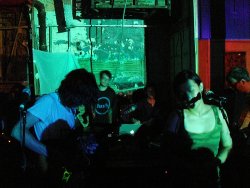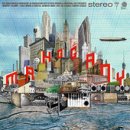100 Musicians Answer the Same 10 Questions
Part Sixty-Three: Mahogany (Andrew Prinz, Robert Gerard Pietrusko, and Jason Holmes)
instigated by dave heaton

The NYC-based dream-pop band Mahogany has taken their already unique music to a new level with Connectivity, a multifacted epic with an urban-planning theme that manages to even improve upon their classic 2000 debut The Dream of a Modern Day. Both albums are on Darla Records, as is last year's exceptional two-disc "early works and rarities" collection Memory Column. Andrew Prinz, Robert Gerard Pietrusko, and Jason Holmes are three of Mahogany's eight members. For more on the group, visit their website and MySpace.
**************************
What aspect of making music excites you the most right now?
Andrew: Recording, writing ideas, working with everyone else in the group.
Robert: Given that Mahogany is about to release a new record, I've been most excited by how it is unfolding. Last night, for the first time, I had the finished CD in my hand. Seeing how the music changes for me once it is out in the world is always a terrific experience. Finding out what worked, what didn't and what was musically illegible-- these are all things that can be as exciting as composing itself. The simple answer, of course, is just playing the CD for my close friends who have seen it develop over the last five years and getting their feedback both emotionally and intellectually.
Jason: I enjoy speaking through my instrument.
What aspect of making music gets you the most discouraged?
Andrew: I get discouraged from time to time, but everything seems like it is possible.
Robert: The fact that, currently, Hedi Slimane is more important to music than Tom Jobim.
Jason: Oversimplified and negative critique by voices only wishing to make noise.
What are you up to right now, music-wise? (Current or upcoming recordings, tours, extravaganzas, experiments, top-secret projects, etc).
Andrew: Recording, producing, art direction.
Robert: The first thing that comes to mind is that my patent application was recently successfully filed for the Embodied Music system--a technical format that aims to reintroduce a full-sense physicality to the music playback experience. Ultimately, this'll mean a lot more grant writing, which I dread, but I'm hoping there will be interesting--if only limited--outcomes. Other than that, I have been developing a series of audio essays, which are part musique concrete composition, part documentary-- a balance between research and spectacle, and a way to challenge some of my assumptions and beliefs. I'm not sure where they lead but I am finding them challenging and rewarding and the response to my first few studies has been positive.
Jason: New songs and remixes.
What's the most unusual place you've ever played a show or made a recording? How did the qualities of that place affect the show/recording?
Andrew: Earlier this year, we played at the Icebox, a Philadelphia art space - all white, 20ft ceilings, our friends at Klip Collective did big projections on all walls - it was immersive and beautiful.
Robert: Recording impulse responses at Le Corbusier's Villa Roche without permission was an interesting and combative experience. Loud bangs in historic buildings tend to be addressed with suspicion and anger.
Jason: I made a mock radio show recording with myself as DJ when I was like 8
years old with my dad's boombox. The mic was built-in and I remember
it having lots of Rolling Stones on it since I had to get everything
from radio broadcast. I recorded songs over and over on that tape
until I wore it out. It sounded pretty muddy towards the end.

In what ways does the place where you live (or places where you have lived), affect the music you create, or your taste in music?
Andrew: Cities seem to have an effect on music, it can mean that your tempos are faster, or that you choose specific keys or time signatures, that you end up emulating the machinery around you in your music.
Robert: New York City is an ideal place to romanticize one's life. If that life includes the making of music, something about being in New York makes it feel that much more urgent and part of the lineage of forwarding American culture. It's grandiose sure, but that's the nature of this city-- ambition and a bit of arrogance.
Jason: I like concentrating on the people around you, not the place itself. Manhattan would be amazing if it was empty, but it's not. Brooklyn is nice 'cause I have my friends all around and nearby.
When was the last time you wrote a song? What can you tell us about it?
Andrew: Working on several ideas - feeling very happy about writing.
Robert: Not a song per se, but I do a lot of field recordings and had a beautiful experience during a recent trip to Milan. Over a period of twenty minutes murmuration upon murmuration of European Starlings descended upon a small city park, clustering in the trees. What began as a few, pointillistic chirps built into a deafening roar which they maintained for over an hour. It was surprisingly terrifying sitting under trees containing literally over a thousand birds asserting themselves. People were running by with fingers in their ears. It was beautiful--perhaps the best sonic moment I've experienced in years.
Jason: I am not good at writing songs by myself. I prefer focusing on drum stuff and song arrangements. I want to learn how to play piano so I can write good songs and melodies.
As you create more music, do you find yourself getting more or less interested in seeking out and listening to new music made by other people...and why do you think that is?
Andrew: Always listening - new music is fun.
Robert: I do find I am less interested in new music but I'm not convinced it's related in any way to my creation of music. I find, with age, one uncovers fundamentals of their tastes and is able to center on those, while at the same time realizing the subtleties yet to be uncovered in the records they already love. There is plenty to delve into there. Depth rather than breadth begins to dominate. That's a musical maturity that I've been happy to discover.
Jason: I will always be interested in music. Music is the best.
Lately what musical periods or styles do you find yourself most drawn to as a listener? (Old or new music? Music like yours or different from yours?)
Andrew: The 'big' cellists like Rostropovich, Casals lately, virginal and harpsichord private pressing LPs, and ELO.
Robert: Focusing on the word "lately," I've been really into roots dub from the 70s, especially Osbourne Ruddock (aka King Tubby). I enjoyed it superficially for many years but didn't really pick it apart until after learning more about Ruddock's methodology. I think the cultural cliches and aesthetic surrounding dub has really prevented it from being treated as serious composition. These records are so important and there is so much reflexivity in the process they could be analyzed as rigorously as a Godard film. Ruddock was especially musical, not just spacing out at the controls, but using the studio to generate theme, variation, recapitulation, and even counterpoint. He should be in the hall of fame.
Jason: I enjoy finding music where the individual layers are simple and
distinct, yet the whole is complex and provocative.

Name a band or musician, past or present, who you flat-out LOVE and think more people should be listening to. What's one of your all-time favorite recordings by this band/musician?
Andrew: I really like 'Broken English' by Marianne Faithfull. It is very glacial, I think Steve Winwood plays synth for it and the sound design is sleek and transformed.
Robert: I could go on and on about the heartbreaking beauty of Talk Talk's Laughing Stock. It's an often overlooked masterpiece. Mark Hollis is one of the great underrated musicians of our generation. I often find a certain solidarity with people who are familiar with this record. It's worth owning and listening to in its entirety, repeatedly, until it makes sense.
Also, I think independent electronic music would be very different right now if Slowdive's Pygmalion had be released on Warp instead of Creation.
Jason: Nice stock question.
What's the saddest song you've ever heard?
Andrew: So far, Roy Harper's 'Another Day'.
Robert: "I Will Wait For You" composed by Michel Legrand for the movie The Umbrellas of Cherbourg.
Jason: "The First Time Ever I Saw Your Face" by Elvis Presley. That's some sad shit.
To check out the rest of the Q&As, click here.
Copyright (c) 2006 erasing clouds |
|